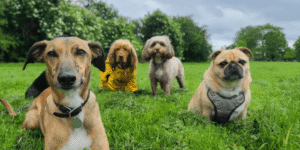
Welcoming a new dog or helping your older dog thrive in our Boise community means focusing on Boise dog socialization right from the start. As a result, you’ll build a foundation for a confident, friendly companion you’re proud to walk around town.
Why Boise Dog Socialization Matters for Every Dog
When you introduce your dog to a variety of experiences—parks, people, other dogs, even local trails—you help them learn:
-
That new sights and sounds are interesting and safe.
-
How to keep calm instead of reacting with fear or stress.
-
How to make good choices when meeting strangers or other dogs.
However, dogs with limited social exposure may:
-
Bark or jump at strangers.
-
Become reactive around animals or new settings.
-
Struggle to cope with novel environments (like Boise’s trails or city sidewalks).
Here’s a helpful guide on introducing dogs to each other.
The Owner’s Role in Socializing Dogs in Boise
As a dog owner, your role is crucial. After all, you are your dog’s anchor. Here’s how you can help:
-
Gradually expose your dog to new places, people, animals—in a positive way.
-
Reward calm, confident behavior with praise and treats.
-
Stay relaxed, so your dog can follow your lead.
-
Watch for signs of stress, and guide your dog back to safety when needed.
In addition, being consistent in these efforts helps your dog build lasting confidence. Over time, these habits shape calm and well-adjusted behavior.
How Professional Help Supports Your Dog’s Social Skills in Boise
Whether your dog is a playful puppy or an adult needing a confidence boost, a trainer can help dramatically. For example, structured sessions allow your dog to practice good behavior around distractions.
Our Board & Train program is a great option for building social skills in a consistent, supervised setting. As a result, many owners report calmer walks and better manners at home.
Additionally, working with a trainer empowers you with the skills to continue reinforcing positive behavior long after training ends.
Real-Life Tips for Boise Dog Socialization Success
Here in Boise, there are plenty of opportunities for effective Boise dog socialization—from local parks to dog‑friendly cafés. Consider the following:
-
Signing up for a group class where your dog sees and learns from others.
-
Organizing short, daily exposures—maybe a new neighborhood nook or local café patio.
-
Tracking progress: for instance, less barking, more calm greetings, more relaxed walks.
That said, always go at your dog’s pace. If they seem overwhelmed, pause and try again another day. Eventually, with enough positive experiences, even nervous dogs learn to trust the process.
Note: If you ever feel your dog’s behavior is more worried than curious, step back and reduce intensity—let them adjust at their own pace.
Final Thoughts
Consistent Boise dog socialization—with our city’s mix of urban and outdoor spaces—is one of the best investments you can make in your dog’s future happiness. Therefore, the sooner you start, the better.
A confident dog means fewer worries, more walks, and more joy for you both. In conclusion, socialization isn’t just about behavior—it’s about building trust, resilience, and connection.
If you have questions about your dog’s behavior or want personalized guidance, don’t hesitate to Contact Us.
Ready to see real results? Board & Train and get your dog on the path to success.
FAQs
What age should I start socializing my dog in Boise?
You can begin socializing your dog as early as 8–12 weeks, once they’ve received initial vaccinations. Early exposure builds confidence and prevents future behavior issues.
Can older dogs still be socialized successfully?
Absolutely. While early socialization is ideal, adult dogs can learn to feel comfortable around new people, dogs, and environments with consistent, positive experiences.
What are signs my dog needs more socialization?
If your dog barks excessively, shows fear or aggression around strangers, or resists new environments, they likely need more structured socialization.
How can I safely socialize my dog in Boise?
Start with calm areas like quiet neighborhoods or parks. Gradually introduce more stimulation, and use treats and praise to reinforce positive reactions. Avoid overwhelming your dog too quickly.
Is a Board & Train program helpful for socialization?
Yes, Board & Train programs offer safe, supervised interactions that help dogs build social skills with guidance from professional trainers.


